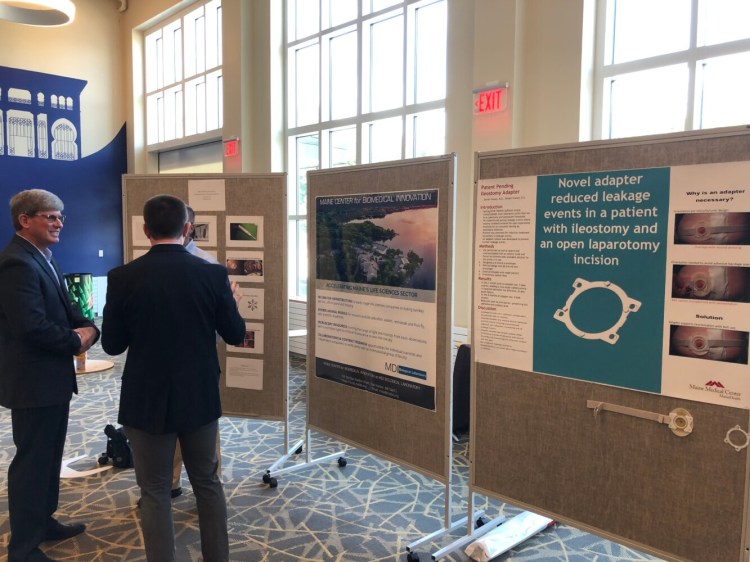Massachusetts economic development guru Kevin O’Sullivan summed up in three words why Maine should put more resources into capitalizing on its home-grown research and development in bioscience: “Jobs, wages, cures.”
O’Sullivan, former president and CEO of Worcester-based life science business incubator Massachusetts Biomedical Initiatives, was the keynote speaker at an all-day bioscience industry seminar Friday at the University of New England in Portland, hosted by the Maine Center for Entrepreneurs.
O’Sullivan said Maine has the potential to build a robust industry cluster around bioscience research that would bring high-paying jobs to the state while contributing to advancements in health and medicine.
“In the olden days, when you commercialized science it was a dirty word,” O’Sullvan said. “Not anymore.”
More than 175 attendees registered for the inaugural Life Science Ventures Seminar, including entrepreneurs, researchers and policymakers. Participants talked about how to turn bioscience research into a successful businesses, the challenges such businesses face in Maine and ways to grow the state’s life sciences industry as a whole.
Tom Rainey, executive director of the Maine Center for Entrepreneurs, said his organization felt the time was ripe for an organized discussion about what it would take to grow Maine’s bioscience industry into a regional powerhouse that would draw more related businesses and entrepreneurs to the state.
“It’s really the first-ever life sciences summit we’ve ever put together,” he said. “I think all the stars are sort of coming into the right alignment.”
Maine already is home to a number of major players in the bioscience field, including Bigelow Laboratory for Ocean Sciences in East Boothbay, The Jackson Laboratory in Bar Harbor and Idexx Laboratories Inc. in Westbrook. Still, Rainey said there has been relatively little coordination on an overarching growth strategy for Maine’s bioscience industry.
“There are all these things going on around the state, but it does seem a bit fragmented,” he said.
Rainey sees the seminar as a first step toward a long-term goal. Future steps will include sharing the knowledge and concerns of bioscience industry participants with state policymakers and lobbying for their support, he said.
Panelists at the seminar included Anne Breggia, research program director at the Maine Medical Center BioBank & Research Laboratory in Scarborough. The BioBank has been overrun with requests from researchers for its fresh and frozen human blood and tissue samples, she said.
Breggia said the BioBank collects samples from both healthy and diseased patients with their consent, and that it has more than 500,000 banked specimens. Still, she said there are more than 200 pending requests for multiple samples, particularly in the field of oncology, and that the BioBank can accommodate only about 30 percent of requests.
“There’s huge, huge room to do more,” Breggia said.
Another panelist, David Eagleson, is president of The Baker Co., a manufacturer based in Sanford that produces biological safety cabinets, cell culture incubators and other bioscience laboratory equipment. The company has about 160 employees in Maine.
Eagleson said Sanford has been a good location for the company’s U.S. manufacturing operation because of its proximity to Boston’s life sciences hub and Maine’s historically strong manufacturing workforce. But lately, hiring has been more difficult because of the state’s skilled labor shortage, he said.
Other impediments for the company include relatively high taxes and regulatory costs in Maine, difficulty attracting scientists and engineers to the state, and high delivery costs for the bulky equipment Baker produces, Eagleson said.
“There are some challenges,” he said. “We make big, metal boxes.”
Panelist Bill Keleher, president and CEO of Kennebec River Biosciences in Richmond, said he sees big opportunities for his company in providing aquatic vaccines and probiotics to the growing land-based aquaculture industry.
Keleher anticipates demand for farm-raised fish will grow significantly in the U.S. as a means to reduce the need for imports and preserve natural fish populations, and he said Maine is well-positioned to capitalize on that growth with bioscience advancements to preserve the health of farm-grown species.
“Maine could really be a leader in the space of marine biotechnology, of blue biotechnology,” he said.
O’Sullivan, the seminar’s keynote speaker, said there is little reason why Maine couldn’t develop a multibillion-dollar bioscience industry cluster as Worcester has done. All it took was a lot of dedication, a little luck and the support of state and local government leaders, he said.
“You’ve got water. You’ve got all this stuff we don’t have,” O’Sullivan said. “You’ve got a brand – a positive brand.”
Send questions/comments to the editors.




Success. Please wait for the page to reload. If the page does not reload within 5 seconds, please refresh the page.
Enter your email and password to access comments.
Hi, to comment on stories you must . This profile is in addition to your subscription and website login.
Already have a commenting profile? .
Invalid username/password.
Please check your email to confirm and complete your registration.
Only subscribers are eligible to post comments. Please subscribe or login first for digital access. Here’s why.
Use the form below to reset your password. When you've submitted your account email, we will send an email with a reset code.